It is frightening to be asked to speak to you today. It is even more frightening when I hear those who have sacred callings in the Church—those much closer to the Spirit than I—acknowledge the great responsibility they feel when asked to speak at a BYU devotional. I don’t know that I will say anything profound today, but I will tell you a few things I have learned from others and from my own experiences, especially experiences I have had at BYU.
Forty years ago last month I became a freshman at this university. I came from a simple background in a small community with a small high school. My life was not even close to being sophisticated by today’s standards, but my home life was one where reading and hard work were taught and valued. As a boy I did not always appreciate the importance of hard work, but I later understood its value in my life. I believe that Nephi’s opening phrase in the Book of Mormon applies to me. Indeed, I was “born of goodly parents” (1 Nephi 1:1)—parents who taught me some of life’s most valuable lessons: to work, to respect those with more experience, to make the best of situations without complaining, to obey, to sacrifice, to wait for what I want most instead of compromising for what I want now, to respect agency, to face accountability, and to value humor.
As I have read and pondered the scriptures through the years, I have been increasingly impressed with their applicability to my life. I suppose this should not be surprising, since Nephi said, “For I did liken all scriptures unto us, that it might be for our profit and learning” (1 Nephi 19:23). I have become more aware each year that events and behavior in my life and in the lives of others are described remarkably well by the scriptures, especially by the Book of Mormon. This recognition has strengthened greatly my testimony of that book. So, if I were to do nothing else today, I would consider myself successful if someone who is listening began to read and ponder the scriptures more faithfully, even every day.
I have often wondered what my life would be like today if I had read from the Book of Mormon for just 20 minutes every day since I first came to BYU in 1960. Had I done that, I would have read the Book of Mormon more than 160 times in those 40 years! I wonder what my perspective of life would be now if I had done that. What would be my knowledge and testimony? What would be my influence on my family? What would be my standing with the Lord? Why didn’t I do it? Was I really too busy? I urge each of you, especially you students, to take steps now so that you do not have to ask yourselves or answer these last two questions: “Why didn’t I do it?” and “Was I really too busy?” Make those choices now to establish habits and patterns in your life that will bring satisfaction in five, 20, 40, or 100 years.
Let me share with you two scriptures, and I will attempt to “liken them” to your BYU and other experiences.
The Savior advised us about the importance of our behavior in the sixth chapter of Luke:
And why call ye me, Lord, Lord, and do not the things which I say?
Whosoever cometh to me, and heareth my sayings, and doeth them, I will shew you to whom he is like:
He is like a man which built an house, and digged deep, and laid the foundation on a rock: and when the flood arose, the stream beat vehemently upon that house, and could not shake it: for it was founded upon a rock.
But he that heareth, and doeth not, is like a man that without a foundation built an house upon the earth; against which the stream did beat vehemently, and immediately it fell; and the ruin of that house was great. [Luke 6:46–49]
Helaman advised his sons Nephi and Lehi using a similar analogy:
And now, my sons, remember, remember that it is upon the rock of our Redeemer, who is Christ, the Son of God, that ye must build your foundation; that when the devil shall send forth his mighty winds, yea, his shafts in the whirlwind, yea, when all his hail and his mighty storm shall beat upon you, it shall have no power over you to drag you down to the gulf of misery and endless wo, because of the rock upon which ye are built, which is a sure foundation, a foundation whereon if men build they cannot fall. [Helaman 5:12]
There is no doubt that we should fill our lives with actions based on principles of the gospel and on the chief cornerstone, Jesus Christ. But there is another application to the analogies in these two scriptures. We can apply the principle of building on a solid foundation in our academic pursuits and in everything else we do. That foundation is preparation. Most of us will recognize times in our past when we were more interested in just finishing something than in learning or gaining real understanding. Tasks like reading a book, writing an essay, fixing a car, mowing a lawn, preparing a meal, cleaning a room, preparing a lesson, finishing a homework assignment, or completing a class are in this category occasionally in our lives. How much better we would be to build on a foundation of real understanding than to “just finish” something.
Often in our hectic lives we forget the opportunity to grow as we complete tasks and face challenges. It is unfortunate that we do not always consider the perspective of the future when we make the “small” decisions or perform the “small” tasks. Let me assure you that I speak from experience. Several times in the past 30 years as a faculty member I have found myself returning to fundamental principles in mathematics and science as I was struggling to understand a current or modern or exciting or sophisticated idea or development. Had I simply given greater effort earlier in life to understand basic principles, I would have saved myself and others considerable time, and I could have provided more help to others later on.
Two examples from my own interest in chemistry problems illustrate some important principles. Please don’t worry too much about the chemistry, although I must say that it is “good chemistry,” at least from my perspective. I would be pleased to discuss “good chemistry” with any of you later if you are interested.
One measure of the interactions between molecules in a substance or a mixture is the heat capacity of that substance or mixture. Let me give a few basic definitions. Heat capacity is defined as the amount of energy, such as heat, in units of calories or joules, that a specified amount of substance, such as a gram or a molecule, absorbs to raise the temperature of that substance by one degree in Celsius, Kelvin, or Fahrenheit. Thus heat capacity of a substance is its “capacity for heat.” A homogeneous mixture of molecules is called a solution, and the amount of a component in a solution is that component’s concentration. For example, sugar dissolved in water makes a solution, and the amount of sugar in that solution defines its concentration.

Until last year, very few heat capacity data had been measured for solutions made by dissolving small amounts of sodium nitrate in water. The best data were available only at room temperature, 25 degrees Celsius, but over a fairly wide range of concentration. In Figure 1, experimental heat capacity values at 25 degrees are indicated by the circles and squares, and the line represents a correlation equation. If we were to predict from these data the heat capacity of a solution made from a small amount of sodium nitrate dissolved in water at, for example, 120 degrees Celsius, we would simply have to assume it is the same as at 25 degrees.
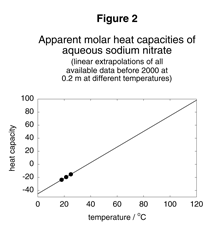
The three circles in Figure 2 are data of lesser quality, but obtained at three temperatures near 25 degrees (fig. 2). We could rely on these three values to extrapolate a long way to estimate the “unknown” heat capacity of the solution at 120 degrees Celsius. Although we might be confident about that extrapolation, it does not represent the truth unless it gives the correct value of heat capacity at 120 degrees. A cautious or experienced person would likely try to avoid making an important decision or recommendation based on that long extrapolation.
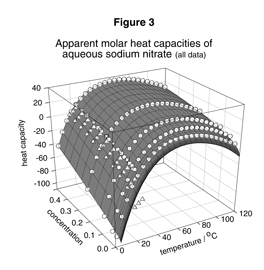
Careful measurements of the heat capacity of solutions of sodium nitrate dissolved in water made this year by BYU undergraduates are shown in a three-dimensional projection in Figure 3. One can readily see from the additional information now available that extrapolation to conditions far removed from those where measurements were previously made would have been seriously in error. There is nothing really wrong with the old heat capacity data for aqueous sodium nitrate solutions, but they are not very useful to describe behavior at significantly higher or lower temperatures. There is an important lesson to learn from this example. Extrapolation beyond our own or others’ experience can be risky. Furthermore, extrapolation from our own perspectives to judge another person’s behavior is even more risky.
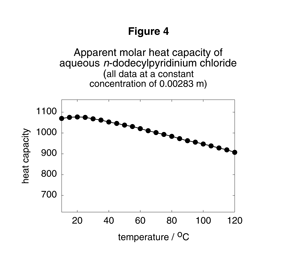
A more striking example of the risks of extrapolation is shown in the next few graphs. The compound n-dodecylpyridinium chloride is a surfactant. Detergents are a class of compounds called surfactants, and it should be obvious that their behavior in water as functions of temperature and the concentration of surfactant are important factors to understand, or at least to know, in the detergent industry. In Figure 4 we see the results of measurements of heat capacity at various temperatures for a solution that contains only a very small amount of n-dodecylpyridinium chloride dissolved in water. One could easily make a fairly safe extrapolation from just a few measurements at a few temperatures to other temperatures that would give “the right answer,” but only because we know “the right answer” at those other temperatures.
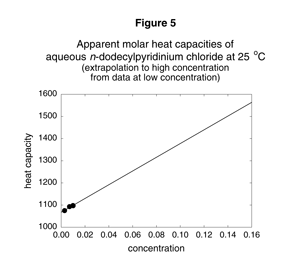
In Figure 5 we see an extrapolation of results of a few measurements at lower concentrations to higher concentrations based on a straight line or linear model. We do not know the reliability of this extrapolation unless someone has measured the heat capacity at higher concentrations.
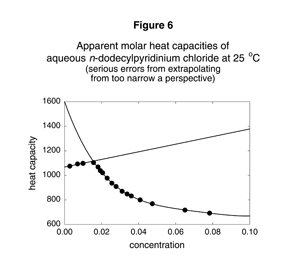
Such measurements at higher concentrations were made at BYU recently, and the results are shown in Figure 6. We can see clearly from this graph that, had we made measurements only on solutions containing the four lowest amounts of surfactant, an extrapolation to larger amounts would have been in error. Similarly, had we made heat capacity measurements only on solutions containing a few or even all of the larger amounts of surfactant, an extrapolation to the smallest amounts would clearly have been in error.
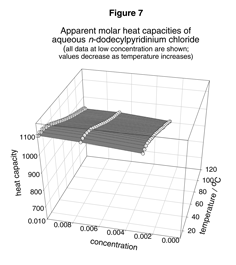
Figure 7 shows the results of four series of heat capacity measurements on solutions of this surfactant at low concentrations as a function of temperature. Note that the trend in heat capacity is toward decreasing values as temperature increases, and we might be persuaded to make an extrapolation or generalization for all concentrations. However, Figure 8 shows results of three series of heat capacity measurements on solutions with about 10 or 20 times as much dissolved surfactant as in Figure 7. Note that the trend in heat capacity here is toward increasing values as temperature increases, which is opposite to what we saw in Figure 7. Thus, if we looked only at the data on this graph we might be persuaded to extrapolate or generalize opposite to what we observed in the previous slide.
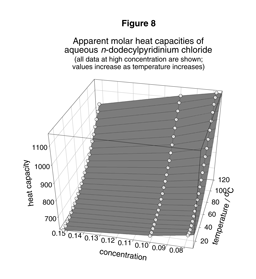
All the heat capacity results for measurements on solutions of this surfactant in water are shown in Figure 9. Only when we have all relevant information can we make a correct judgment about what happens to the heat capacity of solutions of this compound when temperature or the amount of surfactant in solution is changed. It is only when we see all the data that we can rationalize and formulate with confidence a functional model of what is occurring in these solutions. Of course, it would still be risky for us to make extrapolations beyond the boundaries of these data to conditions where measurements have not yet been made.
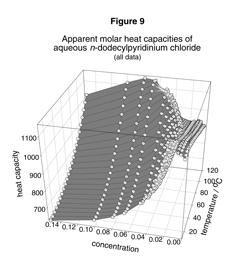
These examples from chemistry illustrate some principles that are applicable in many important aspects of life. As we gain more knowledge and experience, we broaden our perspectives. As we have experiences and gain knowledge in new dimensions, we are able to make connections that allow us to interpolate between related variables and also to make extrapolations beyond the edge of our knowledge and understanding. Generally, the deeper and broader our database of knowledge and experience is, the greater likelihood we have to know and understand truth. We can formulate improved models of the world only when we have sufficient knowledge and perspective. We gain that knowledge and perspective through broad, in-depth study and experience. Since we have limited time to accomplish what we will do in life, it is fortunate that we can gain knowledge and perspective not only through our own experiences and observations but also through the experiences and observations of others. Thus it is crucial for us to listen to and learn from others. Perhaps most important, we can have the influence of the Holy Ghost to teach and guide us even in our academic pursuits and careers as we humbly live the gospel of Jesus Christ.
There are some fundamental steps we must all follow to gain an understanding of, appreciation for, and ability to effectively apply ourselves in both earthly and spiritual matters. First, we must learn the facts about a matter, and often this means learning the facts about many seemingly peripheral matters as well. It is important that we try to gain as much information as time and circumstances allow before we make a decision or claim an understanding.
It seems appropriate to follow the advice in the scriptures about the value of knowledge and understanding. “He that answereth a matter before he heareth it, it is folly and shame unto him” (Proverbs 18:13). “The heart of the prudent getteth knowledge; and the ear of the wise seeketh knowledge” (Proverbs 18:15). “How much better is it to get wisdom than gold!” (Proverbs 16:16). “Wisdom is the principal thing; therefore get wisdom: and with all thy getting get understanding” (Proverbs 4:7). “For he that diligently seeketh shall find; and the mysteries of God shall be unfolded unto them, by the power of the Holy Ghost” (1 Nephi 10:19).
To understand something requires that we gain and retain facts and information. Of course those facts and information should be relevant, or we will waste valuable time analyzing that which is not important. Ultimately, we must judge what information is useful and what information is irrelevant, but that usually requires that we at least become exposed to a variety of information. It is also important that we assess the uncertainty in the information judged as relevant. Clearly we cannot hope to understand, rationalize, interpret, or apply lessons learned by others if we do not know the facts about their experiences. We cannot hope to understand and avoid past mistakes in history unless we know some events of history, any more than we can hope to understand and use chemistry unless we know some facts of chemistry. There will always be those in our society who could have the greatest influence for good but who seem to be interested only in the present and who ignore both the past and the future. Others, however, have “made history” by building on the wisdom of past civilizations—wisdom that was gained only by dedicated study and prayer. Of course this includes many modern and ancient prophets.
Consider the following statements made by modern-day prophets about the value of knowledge, learning, and education.
Every accomplishment, every polished grace, every useful attainment in mathematics, music, and in all science and art belong to the Saints, and they should avail themselves as expeditiously as possible of the wealth of knowledge the sciences offer to every diligent and persevering scholar. [Brigham Young, JD 10:224]
We might ask, when shall we cease to learn? I will give you my opinion about it; never, never. . . .
We shall never cease to learn, unless we apostatize from the religion of Jesus Christ. [Brigham Young, JD 3:203]
True education seeks to make men and women not only good mathematicians, proficient linguists, profound scientists, or brilliant literary lights, but also honest men with virtue, temperance, and brotherly love. [David O. McKay, “Why Education?” Improvement Era, September 1967, 3]
It is my observation that those who make the most of the new discoveries in the sciences or who create new applications in technology do so from the basis of a sound understanding of the fundamental principles of those sciences or technology. I believe that this is also true in nearly any area that might be considered. Thus it seems wise for us to try to understand—not just to study, not just to get a grade in, not just to get a degree in, not just to have experience with—the important foundational principles in any field we either choose or are asked to pursue. I urge you as students to avoid those behaviors and shortcuts that yield only immediate short-term results and that would encourage you to merely “get through” your university experience. Do not compromise your future capability and productivity by losing sight of your goal that you are here to learn and to really understand both spiritual and academic matters. I urge you to build your future on the rock of the Savior and on the foundation of knowledge and understanding of truth.
Consider the words of Brigham Young on the matter of education in the following three statements. “A firm, unchangeable course of righteousness through life is what secures to a person true intelligence” (JD 8:32). “Our education should be such as to improve our minds and fit us for increased usefulness; to make us of greater service to the human family” (JD 14:83). “Education is a good thing, and blessed is the man who has it, and can use it for the dissemination of the Gospel without being puffed up with pride” (JD 11:214).
I have recently reread The Aims of a BYU Education, a document that was developed a few years ago. The Aims document outlines what the purpose of this university is from the perspectives of prophets. Have you students read this document? Have you considered what it says? I believe it will help to clarify your perspectives of why you are here. I believe it is worth the few minutes it takes to read or reread and to think carefully about. May I quote a few more selections from that document.
“Education is the power to think clearly, the power to act well in the world’s work, and the power to appreciate life” (Brigham Young, quoted by George H. Brimhall in “The Brigham Young University,” Improvement Era, July 1920, 831).
The mission of Brigham Young University . . . is to assist individuals in their quest for perfection and eternal life. That assistance should provide a period of intensive learning in a stimulating setting where a commitment to excellence is expected and the full realization of human potential is pursued. [The Mission of Brigham Young University and The Aims of a BYU Education (pamphlet), BYU, 1995, 1]
To this end, BYU seeks to develop students of faith, intellect, and character who have the skills and the desire to continue learning and to serve others throughout their lives. . . .
. . . A BYU education should be (1) spiritually strengthening, (2) intellectually enlarging, and (3) character building, leading to (4) lifelong learning and service. [Mission and Aims, 3]
Also, consider the words of two prophets about their vision of Brigham Young University.
Brother Maeser, I want you to remember that you ought not to teach even the alphabet or the multiplication tables without the Spirit of God. [Brigham Young, in Reinhard Maeser, Karl G. Maeser: A Biography (Provo: Brigham Young University, 1928), 79]
[BYU] has no justification for its existence unless it builds character, creates and develops faith, and makes men and women of strength and courage, fortitude, and service—men and women who will become stalwarts in the Kingdom and bear witness of the . . . divinity of the gospel of Jesus Christ. It is not justified on an academic basis only. [Spencer W. Kimball, “On My Honor,” in Speeches of the Year, 1978 (Provo: Brigham Young University Press, 1979), 137]
[BYU fulfills its promise when] the morality of the graduates of this University provide[s] the music of hope for the inhabitants of this planet. [Spencer W. Kimball, “Second Century Address and Dedication of Carillon Tower and Bells,” Brigham Young University, 10 October 1975, 12]
Also, from the Aims document we read the following about the purpose of our being at BYU:
Every part of the BYU experience should therefore strengthen character—academic integrity in taking a test or writing a research paper; sportsmanship on the playing field; the honest reporting of research findings in a laboratory; careful use of university funds derived from the tithes of Church members; treating all other people with dignity and fairness; and wholehearted acceptance of commitments made to bishops and parents. Character is constructed by small decisions. At this personal level of detail, BYU will realize its hope of teaching “those moral virtues which characterize the life and teachings of the Son of God” (Mission Statement). [Mission and Aims, 11; emphasis added]
Finally, from the Aims document we have this summary:
These are the aims of a BYU education. Taken together, they should lead students toward wholeness: “the balanced development of the total person” (Mission Statement). These aims aspire to promote an education that helps students integrate all parts of their university experience into a fundamentally sacred way of life—their faith and reasoning, their knowledge and conduct, their public lives and private convictions. . . .
[Prophets] have also known that education plays a vital role in realizing the promises of the Restoration; that a broad vision of education for
self-reliance and personal growth is at the very heart of the gospel when the gospel is at the heart of education. To the degree that BYU achieves its aims, the lives of its students will confirm Brigham Young’s confidence that education is indeed “a good thing,” blessing all those who humbly and faithfully use it to bless others. [The Aims of a BYU Education, 14; also see http://www.byu.edu/about/aims/]
Let me share a few brief quotes from the scriptures concerning the importance of humility as we seek knowledge, understanding, and wisdom. “But to be learned is good if they hearken unto the counsels of God” (2 Nephi 9:29). “See that ye are not lifted up unto pride; yea, see that ye do not boast in your own wisdom” (Alma 38:11; emphasis added).
And if men come unto me I will show unto them their weakness. I give unto men weakness that they may be humble; and my grace is sufficient for all men that humble themselves before me; for if they humble themselves before me, and have faith in me, then will I make weak things become strong unto them. [Ether 12:27]
To conclude, I encourage each of you to do the following:
1. Build your life on a foundation of strong spiritual and academic principles.
2. Have faith in the experience of others and learn from their experiences and from your own experiences.
3. Seek all the information you can and assess its quality before you make a decision. Be cautious as you extrapolate or judge.
4. Trust in the future value of learning, both learning in breadth and in depth.
5. Remember those character traits of lasting value, including humility, civility, integrity, industry, rigor, and accountability.
I thank my Heavenly Father for the blessings of learning afforded me and my family at Brigham Young University. In the name of Jesus Christ, amen.
© Brigham Young University. All rights reserved.
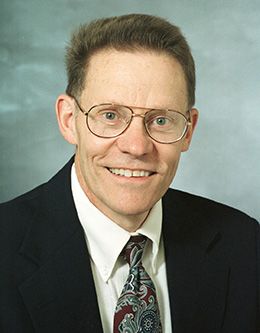
Earl M. Woolley was dean of the College of Physical and Mathematical Sciences at BYU when this devotional address was given at Brigham Young University on 3 October 2000.


